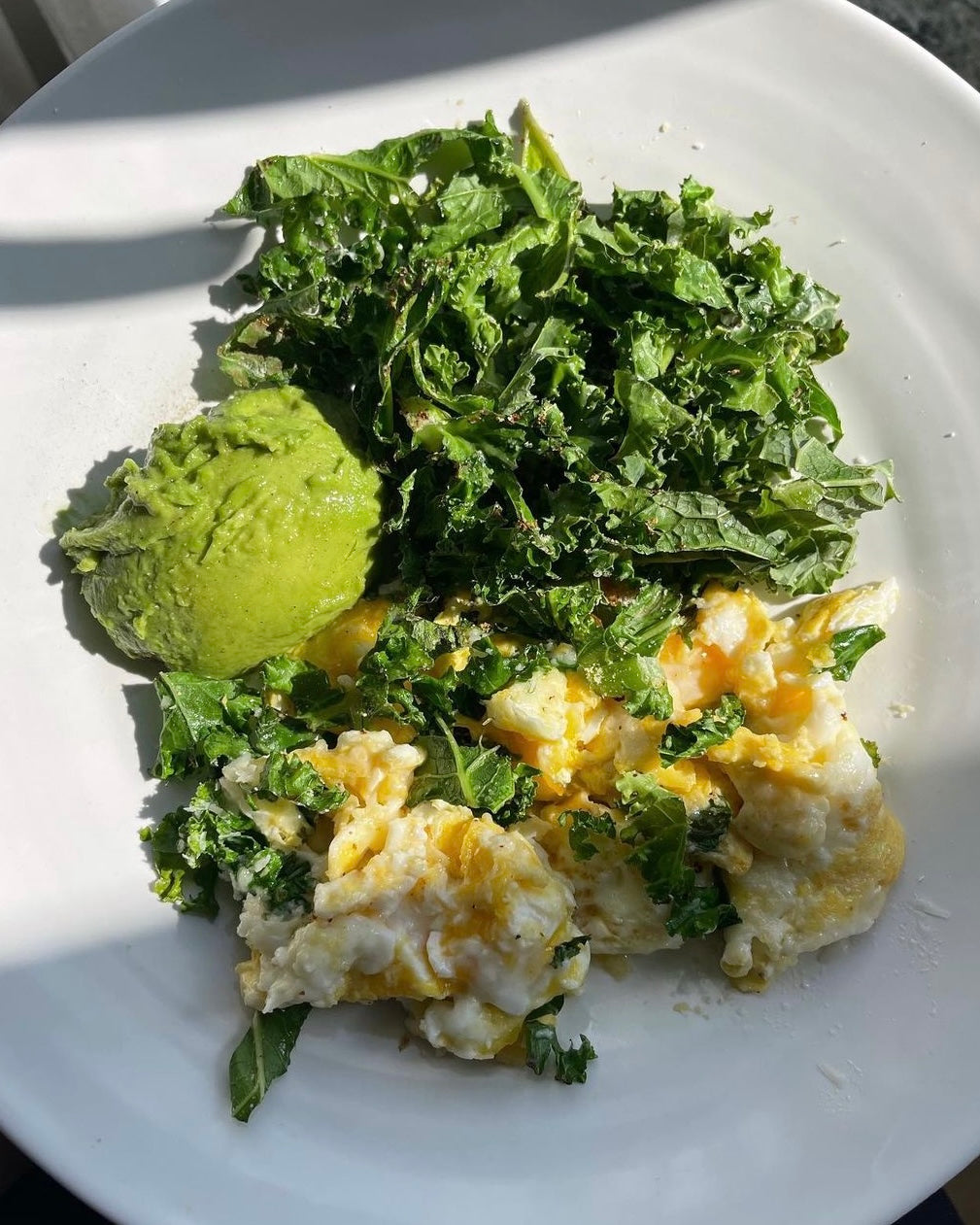This is a transcribed excerpt from the Womensync Podcast , episode #4 Food as a powerful tool for a menstrual cycle and balanced health with Maria Särén . Some adaptations of the text have been made. To listen to the podcast episode with Maria click here .
When it comes to food for hormones, what are the most important aspects to consider?
I think the most important thing is to listen to your body. The periods when we are more hungry and crave more hearty meals, give the body that. Don't follow a schedule where you think it should be a certain way or a specific amount. Our generation has been brought up with the idea that discipline is advocated over instead feeling and listening to the body's signals. It doesn't have to mean that we should roll around and take the day as it comes, but it's about listening in and adjusting where necessary. Dare to eat more in certain periods while in other periods we may not be as hungry - it will even out when you dare to listen in.
We don't need to control calorie intake, a healthy body will do it itself. If you are hungry all the time, it is also a signal that you may not have enough energy.
Many are challenged by this, to listen to the body. We often have an idea for how we should live and eat, which is often rooted in the fact that we grow up in a masculine world that is designed from male biology. For the men it's easier, they can eat, exercise and live in a similar way every day, but it's different for us women. What would you say is a tip for how to find your way back to your body and learn to listen to it?
I think you can start with a goal, either dinner on the weekend, then I really try to listen to what I feel about what and how much. Don't make it too difficult by starting with every meal, every day. Maybe one goal a week is enough, to get a good feel for it and feel it out. Many people think food is very loaded and then maybe you can start with movement, clothes to wear or the like. Just to dare to listen and become aware.
How do our thoughts affect our hormones, menstrual cycle and fertility?
Our thoughts can wander to it in a menstrual cycle that doesn't work as it should . If it is the case that you want to quit your job part way through your menstrual cycle or want to break up with your partner or feel down - wait a week and see if the feeling remains before making any earth-shattering decisions. A powerful tool is to become aware of your thoughts, write them down in order to get an outlet for what you feel and think. I meet many women who are sitting in the life of young children and who feel guilt and shame for certain feelings they feel. The same for many who have undergone IVF who longed for children for several years but now feel irritated and tired. Dare to let the thoughts come and pass without judgement. If we don't allow ourselves to feel certain feelings and thoughts, they will eventually bubble up even more. It can be a great resistance to write precisely "ugly" thoughts about yourself, your life or your children, but I personally and many clients have found it to be very helpful. Many times this is about the fact that you may not have had much recovery, slept too little or fed the body too little.
We are all unique and need different things, but in general how should one think for a menstrual cycle and hormones in balance?
I think we need to eat more home cooking, cooked food in various forms such as fish, potatoes, vegetables, meat and all kinds of animal products. To simply eat stable real food. An important part to highlight is this with saturation. I think many people, consciously or not, avoid the feeling of being "too full" and that it is something that can be sensitive and thus affects how much we eat and what. There is so much connected to food that we forget all the beautiful and wonderful things about it. Personally, I like to eat seasonally and vary my diet.
Something you advocate is eating "real food" with fruit, which may feel new and unusual to many. What would you suggest for breakfast that is real food?
A simple thing is omelette. Other options are fish on the cod, cold root vegetables with chicken mash, soup or eggs in various forms. It saddens me when I see women try so hard when it comes to food but then they eat, in my opinion, a dessert of for example chocolate protein powder with various toppings for breakfast. It is good but not enough for a breakfast. I see that many of these women do not always feel well but have many problems connected to the menstrual cycle and fertility.
We know that bread can be a difficult issue. What kind of bread should you actually eat? What are your thoughts on that?
Bread itself can be a good carrier of accessories. A sandwich in itself is not enough, but only contains lots of carbohydrates that can negatively affect blood sugar for the rest of the day. The same applies to oatmeal, you often stay full for an hour or so but then hunger comes and blood sugar goes on a roller coaster ride. If we invest in a little more protein instead, we will be more stable throughout the day.
One of the reasons why you advocate "real food" for breakfast is linked to blood sugar. How is blood sugar important to the menstrual cycle?
Firstly, we have the obvious effect that blood sugar problems can be associated with PCOS. PCOS is a syndrome where you don't ovulate properly. We want a balanced blood sugar, because if the blood sugar rises very quickly, it often drops again very quickly. Cortisol then comes in to push the blood sugar up, as blood sugar that is too low is life-threatening. Here, a roller coaster is created, which becomes a stress on the body. You can notice an unbalanced blood sugar in the form of symptoms such as dizziness, cold sweats, blurred vision or tunnel vision, palpitations, irritation and becoming "hangry" which many people can recognize.
You mention PCOS but blood sugar problems don't have to be linked to PCOS?
It comes down to whether you are predisposed to PCOS or not I would say, we all have a weak link. My weak link was autoimmune disease and I know that if I mistreat myself or push too hard, I risk ending up there again. For someone else it is PCOS and a third thyroid problem which is also an autoimmune disease in most cases.
Blood sugar and PCOS are connected, how can an unbalanced blood sugar be expressed in other ways in the menstrual cycle?
It can, for example, be expressed in a premature and low-quality ovulation. How you know that your ovulation is not qualitative can be seen in the form of the luteal phase (phase 3) being too short. You would like to have a phase 3 that is over 10 days, closer to 14 days. It's simply how you see how strong your ovulation is.
So the reason you advocate real food for breakfast is to maintain a balanced blood sugar which helps us to have a balanced menstrual cycle?
Yes exactly. The body needs to feel safe in order to carry a child. So for it to be safe, we need to do what we can for it, where a balanced blood sugar is important.
How can you stabilize your blood sugar, apart from diet?
Sleeping is important. If you sleep poorly, diet hardly matters. In other words, you can eat great but it will still fluctuate. Exercise increases insulin sensitivity, which makes you better at managing blood sugar, so exercise is also a good tool.
Exercise has many health benefits but is there any time in the menstrual cycle that we may need to cut back on exercise?
Yes, if you don't eat or sleep enough or are stressed. Nor have I seen any woman who felt good from running several miles a week. The important thing is to adjust the training and remember that you don't always have to push yourself to the limit. Instead of long-distance running, you can, for example, do strength training, canoeing, dancing or the like. Again, you need to look within; do you feel good about what you do? Then you may think that you feel well but that the body experiences stress from it.
–––––
Maria Särén works based on a functional medicine approach and is educated at the Kresser Institute, is a certified ICF coach and runs the women's clinic Liva in parallel with her own practice Emanera . Maria's mission is to help as many women as possible feel good and live in sync with their biology. Read more about Maria here and follow her on Instagram for more inspiration and knowledge.
